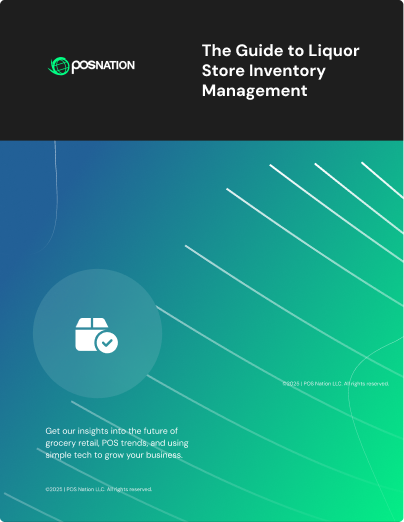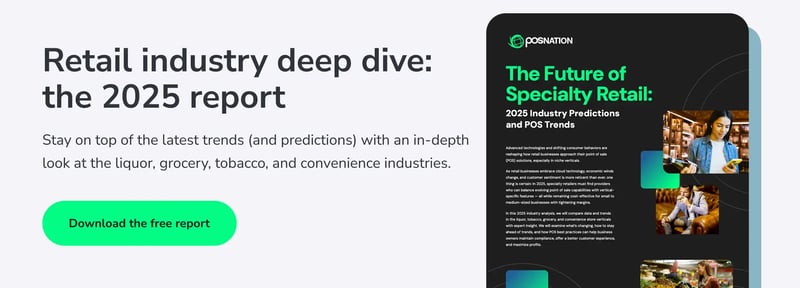Are you still tracking customer information across spreadsheets, sticky notes, and whatever you can store in your brain’s memory bank?
If so, you’re not alone — but you are making things harder than they need to be.
Most independent retailers juggle customer preferences in one place, purchase history in another, and communication scattered across email, text messages, and casual conversations. The result is missed opportunities, forgotten details, and customers who don't feel valued.
Research shows that 89% of customers who have a positive, personalized experience in a store are likely to shop there again. When you can’t create those personalized experiences on a regular basis, you’re leaving money on the table.
The solution? A customer relationship management (CRM) system designed for retail management. The right CRM transforms scattered customer data into actionable insights that drive sales and build customer loyalty.
But how can you find the right CRM for your business?
This blog covers everything you need to know — why retailers need CRM systems, the essential features that actually matter, and our top five solutions that work for businesses like yours.
Why Retail Businesses Need a CRM System
Running a retail business means juggling countless customer interactions every day. You're dealing with seasonal shoppers who disappear for months, regulars who expect you to remember their preferences, and new customers who need extra attention if you want them to come back. Add in the pressure from big-box stores and online retailers, and it's clear that generic customer service doesn’t cut it.
Every missed opportunity hurts. When you can't remember your customers’ favorite products or recent purchase history, you lose the upsell. When you're sending the same generic promotions to everyone, you're wasting marketing money.
Poor customer data management doesn't just cost you sales, it costs you relationships. And in retail, relationships are everything.
A retail CRM system streamlines your customer relationships, so you can focus on growing your business. With this in mind, let’s explore our list of the things you need to look for when choosing the right CRM for your store.
6 Essential CRM Features Every Retailer Needs
With dozens of CRM platforms available, narrowing down your choices can be a challenge. Let’s break down the essential features to look for when comparing CRM options for your retail business:
- Customer purchase history and preference tracking: Your CRM should remember everything, so you don't have to. Track buying patterns across seasons, note style preferences and sizes, and record special occasions like anniversaries or birthdays. When integrated with your point of sale (POS) system, this information flows instantly to their customer profile at checkout.
- Multichannel customer communication: Your CRM should handle email campaigns, SMS notifications for sales and new arrivals, and track in-store visits. When everything connects, you can send personalized messages that actually resonate instead of generic blasts that get ignored.
- Sales pipeline management: Depending on your industry, some of your larger sales might take multiple visits. You need a system that can track leads for high-ticket items, schedule follow-ups for interested customers, and manage quotes for custom orders.
- Customer segmentation: Find a CRM that can group customers by purchase behavior and create targeted campaigns that actually work. Personalized product recommendations based on past purchase patterns help make customers feel special (and buy more).
- Team collaboration: Your whole team should be on the same page. Your CRM should allow you to assign follow-up tasks, share customer notes across staff, and track performance by sales associate.
- Reporting and analytics: Your CRM should calculate customer lifetime value, analyze seasonal trends, and track your marketing campaigns. Understanding what's working helps you make smarter decisions about inventory, staffing, and promotions.
Related Read: 18 Essential Reports for Your Store Performance Dashboard
Your store might need additional features and functionality, depending on your industry and individual needs, but look for these six features at a minimum.
The 5 Best CRM Systems for Retail Businesses
Every retailer has slightly different needs from their customer relationship management solution, but we’ve narrowed it down to five standout picks. For each, we’ll share key features and pricing, so you have all the information you need to pick the best solution for your retail store.
1. Hubspot
Best for: Growing retail businesses that need an all-in-one marketing, sales, and customer support tool
HubSpot's Smart CRM puts your customer data, teams, and technology on one platform, making it perfect for retailers who need more than just contact management. The AI-powered system automatically captures customer interactions and provides insights that help you create personalized experiences at scale.
Key features:
- Free CRM with unlimited contacts and users
- Built-in email marketing and automation tools
- Customer service ticketing and live chat
- E-commerce integrations with Shopify and WooCommerce
- Advanced reporting and analytics dashboards
- Custom properties and objects for retail-specific data
- Mobile app for on-the-go management
Pricing: Free plan available with core CRM features; Marketing Hub starts at $20/month; Sales Hub at $20/month; Service Hub at $20/month
2. Salesforce
Best for: Large retail chains and enterprise operations that need advanced automation
Salesforce is an enterprise-level sales and customer relationship management platform with advanced tools and functionality. The platform's AI capabilities and strong automation features help enterprise retailers manage complex operations and scale their customer service efforts.
Key features:
- Einstein AI for predictive analytics and personalization
- Commerce Cloud for unified B2B, B2C, and D2C operations
- Advanced workflow automation and process builder
- Multilocation inventory and order management
- Extensive third-party app marketplace
- Advanced reporting and forecasting tools
- Enterprise-grade security and compliance features
Pricing: Essentials starts at $25/user/month; Professional at $80/user/month; Enterprise at $165/user/month; custom pricing for large implementations
3. Zoho CRM
Best for: Small to medium retail businesses that need basic CRM functionality
Zoho CRM offers an incredibly user-friendly and customizable platform that grows with your business. The system's easy-to-use interface makes it easy for retail teams to navigate and manage customer relationships without tons of specialized training.
Key features:
- AI assistant (Zia) for sales predictions and automation
- Built-in inventory management capabilities
- Email marketing and social media integration
- Customer portal for self-service options
- Mobile apps for iOS and Android
- Workflow automation and custom functions
- Multicurrency and multilanguage support
Pricing: Free plan for up to three users; Standard at $20/user/month; Professional at $35/user/month; Enterprise at $50/user/month
4. Klaviyo
Best for: Online retailers and e-commerce businesses
Klaviyo offers an all-in-one CRM specifically designed for e-commerce brands. Built on the Klaviyo Data Platform with AI capabilities, it’s great at tracking purchase behavior and online engagement patterns to make targeted recommendations.
Key features:
- Advanced email and SMS automation flows
- Predictive analytics for customer behavior
- Real-time segmentation based on purchase data
- AI-powered product recommendations
- Abandoned cart and browse abandonment campaigns
- Customer lifetime value tracking and forecasting
- Deep e-commerce platform integrations (Shopify, WooCommerce, Magento)
Pricing: Free up to 250 contacts; Email plans start at $20/month; Email and SMS plans start at $35/month; custom pricing for high-volume senders
5. Integrated POS and CRM All-in-One Solution: POS Nation
Best for: Small and medium-sized retailers who want their POS and customer management working together
POS Nation's integrated approach eliminates the headaches that happen when you try to connect separate POS and CRM systems.
With an integrated POS and CRM like POS Nation’s partner solutions, your customer data, purchase history, and loyalty programs all live in one place, making it easy for your team to provide personalized service. With industry-specific solutions for liquor stores, convenience stores, grocery markets, and specialty retail, we have a top-tier solution for you — no matter what kind of store you run.
Key features:
- Cloud-based POS with built-in CRM capabilities
- Integrated customer loyalty and rewards programs
- Real-time inventory management and reporting
- Automated email marketing through Mailchimp integration
- Customer purchase history and analytics
- Phone sales and quote management
- 24/7 customer support
Rather than forcing you to adapt your business to generic software, POS Nation provides a retail-specific solution that works the way your business actually operates.
Pricing: Custom quotes based on your specific business needs and industry requirements
How To Choose the Right CRM for Your Retail Business
Choosing the right CRM doesn't have to feel overwhelming. Follow these five straightforward steps to find a system that works best for your business.
Step 1: Assess Your Current Processes
Start by taking an honest look at how you're managing customer relationships right now. Are you tracking customer information on spreadsheets? Sticky notes? In your head?
Identify what's working and what's driving you crazy. Most importantly, figure out how your current POS system handles customer data and what gaps need filling. This self-assessment shows you exactly what problems you need to solve.
Step 2: Define Your Budget and Team Size
The monthly subscription cost of your CRM is only one piece of this puzzle. Remember to factor in setup fees, training time, data migration costs, and any integration expenses with your existing systems. The option that seems cheapest isn't always the best value if it doesn't solve your problems or requires expensive add-ons later.
Step 3: List Must-Have Features
We discussed the core CRM functionality that’s nonnegotiable, but what other features do you need for your store? Industry-specific features like inventory integration, seasonal campaign management, or loyalty program tracking might be essential for your business type. A word of caution, however: Don't get distracted by flashy features you'll never use.
Step 4: Test With Free Trials
Don’t make a decision before you’ve seen the solution! Most CRM and point of sale providers offer demos and trials — use them! Don't just click around the interface, test it with real customer data and actual workflows your team uses daily. Get your staff involved in the testing process since they'll be using it every day.
Step 5: Consider Implementation and Training
Finally, prepare to train your team. The best CRM in the world is useless if your team won't use it consistently. Consider how long it'll take to migrate your existing customer data, train your staff, and get everyone comfortable with the new system.
Choosing the Best CRM For Your Retail Business
The right CRM can be a game-changer for customer service in your retail operation. Using the information and options in this guide, you should be able to find the solution that will help you build incredible customer relationships that keep people coming back.
There's no one-size-fits-all solution. But here's what we've learned after working with thousands of retailers: The best CRM is the one that your team actually uses. Complex systems with dozens of features often get ignored, while simple, integrated solutions can become the backbone of your business.
If you're an independent retailer who's tired of juggling separate POS and customer management systems, there's a better way. POS Nation combines everything you need — point of sale, customer tracking, inventory management, and loyalty programs — in one reliable platform built specifically for retail businesses like yours.
Don’t make your life harder with disconnected systems. Schedule a free demo with POS Nation today.







 by Brian Sullivan
by Brian Sullivan


